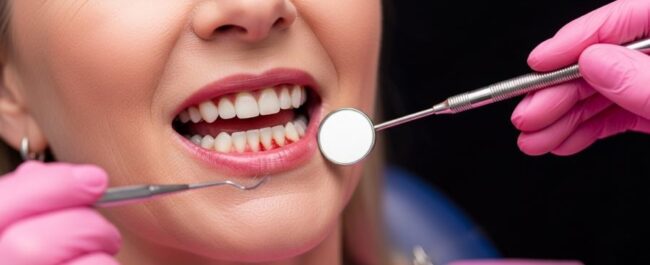Why Your Gums Might Be Aging Faster Than You Are
We often talk about aging in terms of wrinkles, grey hair, and sore joints—but what about your gums?
Gum health rarely gets the spotlight, yet it plays a critical role in your overall well-being. And here’s the catch: your gums might be aging faster than the rest of you. From inflammation and bone loss to receding gum lines, your mouth may be showing signs of “oral aging” long before you notice anything else.
At Reflections Dental, we help you care for your teeth and gums at every age. From early prevention to advanced periodontal treatment, we’re here to support your full oral health”
Understanding Gum Aging
Gum tissue doesn’t wrinkle or sag like skin, but it undergoes structural changes over time. As you age, blood flow to the gums can decrease, healing slows down, and gum tissue becomes more susceptible to bacteria. For many people, this results in gum recession, increased sensitivity, and eventually tooth loss.
One of the most common age-related gum issues is periodontitis, a chronic inflammatory condition that affects the soft tissue and bone supporting your teeth. According to the Canadian Dental Association, nearly 7 in 10 Canadians will develop some form of gum disease in their lifetime.
It’s Not Just About Age
The real culprit isn’t just age—it’s what accumulates with it. Plaque buildup, smoking, diabetes, dry mouth (often caused by medications), and even stress all contribute to faster gum aging. That means your gums might be 60 while you’re only 45—especially if your oral hygiene hasn’t kept up.
Some signs your gums may be aging prematurely include:
- Persistent bad breath
- Bleeding when brushing or flossing
- Gum recession
- Increased tooth sensitivity
- Loose teeth or shifting bite
Gum Health Is Whole-Body Health
Here’s where it gets serious: poor gum health doesn’t just threaten your smile—it’s linked to systemic conditions like heart disease, diabetes, and even cognitive decline. Inflammation in the gums can lead to inflammation elsewhere in the body, creating a feedback loop that accelerates health decline as you age.
Studies have shown a connection between periodontitis and conditions such as:
- Alzheimer’s Disease
- Rheumatoid arthritis
- Cardiovascular disease
- Diabetes complications
Keeping your gums healthy isn’t cosmetic—it’s essential.
How to Keep Your Gums Young
There’s no reversing age, but you can slow gum aging dramatically with the right habits and professional care:
- Brush gently but thoroughly twice a day with a soft-bristled toothbrush
- Floss daily (yes, really!)
- Schedule regular dental cleanings—plaque and tartar buildup is impossible to manage on your own
- Ask about scaling and root planing if you have signs of gum disease
- Use mouthwash or rinses formulated for gum health
- Quit smoking, which accelerates tissue breakdown and reduces healing
- Stay hydrated, especially if you take medications that cause dry mouth
And don’t assume that no pain = no problem. Gum disease is notoriously silent in its early stages.
What Dentists Can Do
Beyond regular cleanings, dentists can monitor your gums for subtle signs of decline and offer treatments that maintain their integrity, such as:
- Deep cleaning (scaling and root planing)
- Localized antibiotics or antimicrobial rinses
- Gum grafts for recession
- Periodontal maintenance every 3–4 months for high-risk patients
At Reflections Dental, we often screen for gum issues during your routine check-ups and provide options tailored to your needs and stage of gum health.
Reframe the Focus
Think of your gums as the foundation of your smile. You wouldn’t ignore the cracks in your home’s foundation—so why ignore them in your mouth?
Keeping your gums in good shape now can save you from costly and complicated treatments later—and contribute to better health from head to toe.


